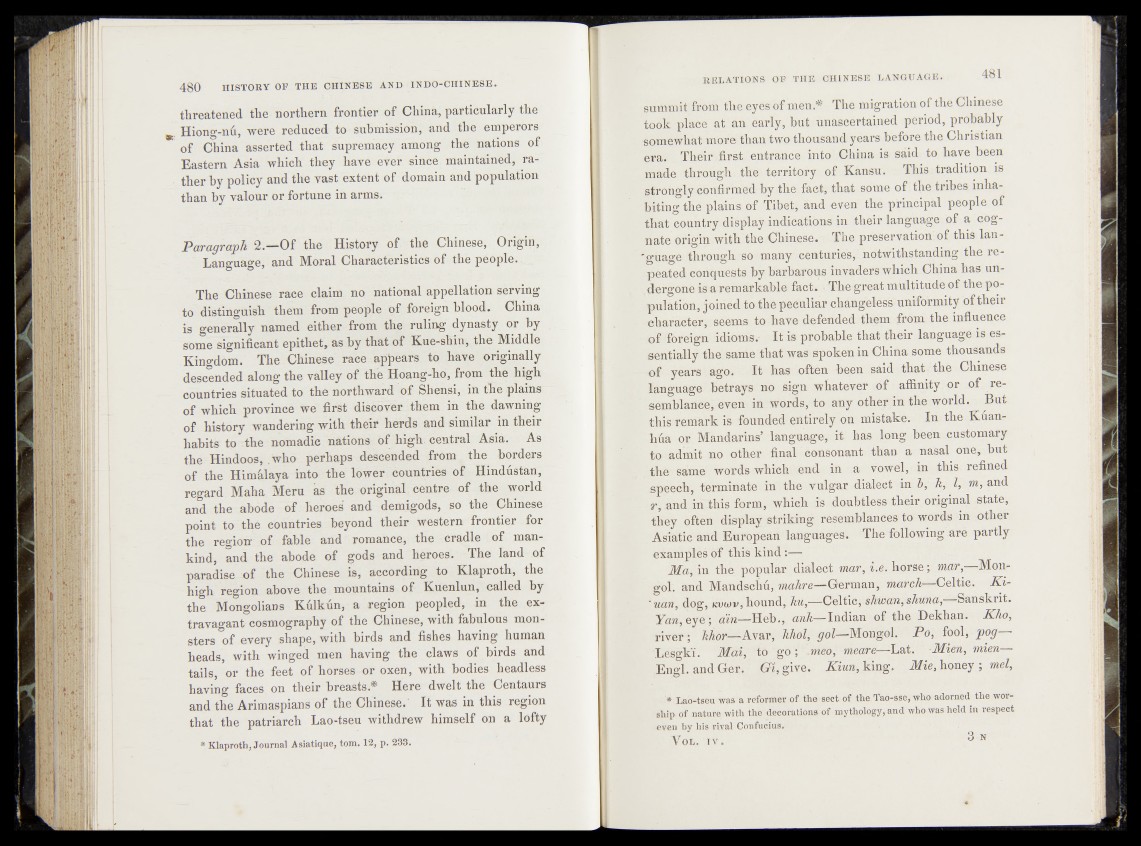
threatened the northern frontier of China, particularly the
Hiong-nh, were reduced to submission, and the emperors
of China asserted that supremacy among the nations of
Eastern Asia which they have ever since maintained, rather
hy policy and the vast extent of domain and population
than by valour or fortune in arms.
Paragraph 2.—Of the History of the Chinese, Origin,
Language, and Moral Characteristics of the people.
The Chinese race claim no national appellation serving
to distinguish them from people of foreign bipod. China
is generally named either from the ruling dynasty or by
some significant epithet, as by that of Kue-shin>,the Middle
Kingdom. The Chinese race appears to have originally
descended along the valley of the Hoang-ho, from the high
countries situated to the northward of Shensi, in the plains
of which province we first discover them in the dawning
of history wandering with their herds and similar in their
habits to the nomadic nations of high, central Asia. As
the Hindoos, .who perhaps descended from the borders
of the Himâlaya into the lower countries of Hindustan,
regard Maha Meru as the original centre of the world
and the abode of heroes and demigods, so the Chinese
point to the countries beyond their western frontier for
the region of fable and romance, the cradle of mankind,
and the abode of gods and heroes. The land ,of
paradise of the Chinese is, according to Klaproth, the
high region above the mountains of Kuênïun, called by
the Mongolians Kfilkun, a region peopled, in the extravagant
cosmography of the Chinese, with fabulous monsters
of every shape, with birds and fishes having human
heads, with winged men having the claws of birds and
tails or the feet of horses or oxen, with bodies headless
having faces on their breasts.* Here dwelt the Centaurs
and the Arimaspians of the Chinese. It was in this region
that the patriarch Lao-tseu withdrew himself on a lofty
* Klaproth, Journal Asiatique, tom. 12, p. 233.
RELATIONS OF THE CHINESE LANGUAGE. 481
summit' from thenyps&f men.* The migration of the Chinese
'tooktpfe© at an> Par3#; but unascertained period, probably
somewhat l|p£e! tha-ia.:tWio thousand years-before the Christian
era. Theirs first entrance, bitty China is said to have been
made through the$tuffitorfeof Kansuv This.tradition is
stronglybonfirmed by the - faeff that spmeofithe tribes, inhabiting
t h e T i b 4 f § E t n d even thmprincipal people of
that country' displa^dndisations in itheir language*‘of ,a cognate
origin w ith ’th e :^ ld ^ ^ ) The preserv atipiu of this lang
u ag e through|s®»any^centuries,'notwithstanding4the re-
-peated. con quests b a ^ jq u s invaders which China has undergone
is a-refharkableffact. • The^^eafein-nltbude of the population,
j oined to the peculiar changyes|^un*ifor.mity of their
character j seems, to .have defended them from the influence
oMoreigh idioms.- ■ It.is probable- that thdir language.-ibeir
sentially thtysame that was spoken in China some thousands
-o f years ago. It has often b^en .said that Afh.e/>Ghinese
language betrays no sign whatever idf affinity. or of re-
semblanefeh'even in words, to any othepiin the world ./< But
thisi-remurk is 1 founifetkentirely'on mistake.' In»the.Kuanr
hua or Mandarins’ language, ifc has long been customary
to admit no other final i consonant than a nasal one,-.-.but
the same- Words which end in a vowel, in this, refined
.speech, terminate in the vulgar diafept-dn b, k, l, m, and
r , and indhis form, which is doubtless fheir. original state,
they often display striking resemblances to words -in other
Asiatic and European languages. The;fdtdwiifg are partly
examples of this kind '
Ma, in the ^popular dialect mar,4.'e, borse; mar,—Mongol.
and Mandschu,.mahre—German, Tnarcfc-^-Celtie. Ki-
*uan, dog, kuwv, hound, ku,—Celtic, shioan^shuna, Sanskrit.
Yan, eye; din—Heb., ank—Indian-bf the Bekhan. Kho,
river ; hhor— Avar, khol, gol— Mongol. Po, fool, peg—
Xesgk'i. Mai, to go ; \meo; ' d e a r - M i e n , mien—
Engl, and Ger. G^givet- A s k i n g . Mie, honey ; mel,
* Lab-tseu was a reformer.of the’sect of the.Tao-sse,who adorned the worship
of nature with the decorations of my thology, and who was held in respect
even by his rival ©obfueius.
Yol. tv. ^ n